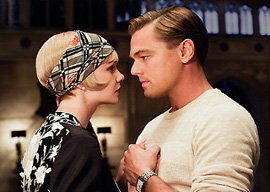
February 18, 2013

Cary Mulligan and Leonardo DiCaprio
Which is where Hollywood comes in. Out West they can film anything that has to do with wealth and privilege. (It’s always shown in a bad light). Where they get into trouble is when trying to depict how deeply the hero of Fitzgerald’s novel has his roots implanted in the nature of the genteel champion, the creator of romantic dreams. (Dick Diver in Tender and Monroe Stahr in Tycoon, ditto.) Fitzgerald was the last to grow up believing in the genteel romantic ideal that pervaded late-nineteenth-century American culture. Gatsby is an easy short read, but the novel is full of fine-spun patterns and ironies. The wife, at the wheel of her lover’s car, runs down and kills the lover of her husband. Gatsby and Myrtle have a lot in common, and when the latter dies the magic aura departs from Gatsby’s quest. This is very difficult to film; in fact it’s impossible. DiCaprio can mug, but he can”t do Fitzgerald.
Gatsby’s grail is not Daisy, but the security and wealth and power of the plutocratic American upper class. Without knowing it, Fitzgerald painted the American experience on Gatsby’s character, his romantic quest and tragic failure:
Gatsby believed in the green light, the orgiastic future that year by year recedes before us. It eluded us then, but that’s no matter “ tomorrow we will run faster, stretch out our arms farther…And one fine morning.
Poor old Scott. He died broke and believing himself a total failure, but ten years after his 1940 death in the arms of Sheila Graham, his star was back. His books became best sellers, Hollywood filmed all his novels (some many times over), and his place in the American literary canon is secure. Jay Gatsby, or James Gatz, is the quintessential American hero: a dreamer, a bootlegger, and a fine man who served his country in the war and returned determined to be somebody. What can be more American than that? Read or reread the book and give the movie a pass. DiCaprio is no Gatsby. He’s not even Gatz.